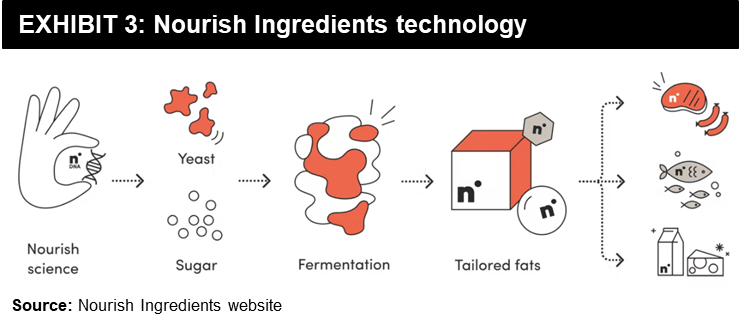Overview of Precision Fermentation
Fermentation is a relatively old technology that is now being utilized to produce microbial proteins that can replace animal proteins in alternative dairy and meat segments. Precision fermentation utilizes microbes to produce specific ingredients. The genes for the components may be spliced into the genome of the microbe or they could be induced to produce larger quantities of the required end-product using techniques such as UV radiation.
The applications of precision fermentation in the alternative protein segment have been rising rapidly. Other fermentation types such as traditional and biomass have also grown. Traditional fermentation is utilized for applications such as kefir beverages and non-dairy probiotic beverages due to its capability of fortification using probiotics and improving sensory properties. Biomass fermentation is utilized to produce proteins extracted from microbes that can be used in alternative meat due to its clear taste and nutrition.


Why is the precision fermentation segment growing in demand?
Precision fermentation allows a lower carbon footprint as a lower amount of land and water is required to produce specific ingredients e.g. casein, gelatin, vitamins. Microbes can also utilize agricultural waste as a substrate for their growth, thereby promoting a circular economy. Precision fermentation takes place in industrial fermenters with controlled environments hence the output remains independent of climatic variations. Microbes, fungal, or algal sources have a high multiplication rate thus a higher quantity of purified end-product can be obtained. The capability of precision fermentation to produce any required end-products allows its applications to be across industries such as food, agriculture, pharmaceutical, biologics, textile, and personal care. Thus, precision fermentation has rapidly grown in its commercial applications in the past few years.


The Drawbacks of Precision Fermentation
Precision fermentation relies on genetic modification to produce proteins that are not naturally found in microbes. While genetically modified products have been available to consumers since the early 1990s, consumers are still unaware of how genetic modification works and its use in our food supply. Regulations in this segment vary across regions with higher regulation in Europe. The cost of production is also a drawback due to the requirement of high sterility and complicated extraction processes. The high cost also deters scalability for companies with lower infrastructure capabilities.
Companies using precision fermentation in alternative proteins
Despite the challenges and drawbacks precision fermentation is here to stay. Multiple start-ups and established players are involved in utilizing precision fermentation to produce proteins that can be used in alternative protein applications
The EVERY Company (formerly Clara Foods ) (USA)
- Produces eggless albumen protein, egg white, and pepsin using genetically modified yeast cells
- EVERY Protein: The protein has a neutral sensory profile, optical clarity, high solubility, and can be used in hot or cold beverages
- EVERY EggWhite: The component is a 1:1 egg replacer, and can be used in a variety of applications such as desserts, mixes, and patties
- EVERY Pepsin: The component is a 1:1 porcine pepsin replacement, it has higher activity than animal-derived pepsin. It can be used in nutritional supplements, food processing aids, and lab reagents
- The end products are claimed to not contain rDNA, GMO organisms, or sugar
- Ingredients can be used in baking products, food, beverage products, and as nutritional supplements
- Commercialized animal-free pepsin using distribution partner Ingredion. Egg protein is available for commercial scale
The company uses DNA splicing techniques to introduce genes into yeast cells. The company has partnered with multiple players such as Ingredion, Pressed, and AB InBev to scale up and commercialize its proteins. The company has commercialized animal-free pepsin using distribution partner Ingredion. Egg protein is also available for commercial scale.
Geltor (USA)
- Produces animal-free collagen, and, elastin
- PrimaColl: Nature-identical to bioactive Type 21 poultry collagen. It helps activate additional collagen production in the body
- Elastapure: Bioidentical human elastin ingredient with anti-oxidant properties, high uniformity as well as purity
- HumaColl21: Colorless, odorless alongwith collagen, elastin, laminin, and fibronectin-boosting properties
- Collume: Animal-free collagen that can increase skin firmness and elasticity, and improve skin moisturization
- Received over USD 114 Mn in funding
- Claims final products are non-GMO
Start-up Geltor has received funding from ingredient manufacturing companies such as GELITA and Archer Daniels Midland. The company has also claimed to have scaled up its production 100 times. It plans to scale up its business and manufacturing operations further. Geltors bioactive ingredients such as collagen and gelatin (derived from collagen) can be used to replace their animal-based counterparts in plant-based products and skin-care.
Nourish Ingredients (Australia)
- Produces animal fats using engineered proprietary yeast strain
- Reproduce flavor profiles that reproduce the taste and mouthfeel of animal protein
- The end-products production process is claimed to be price competitive and efficient
The company’s animal-free fats can foster a superior Maillard reaction in plant-based meat. This allows close replication of aroma, color, and taste similar to animal meat. Nourish Ingredients has recently partnered with Vow to create cultured meat with precision fermentation-derived animal fat. The partnership will entail the development of hybrid cultured meat and microbial protein-containing end-product.


Need a thought partner?
Share your focus area or question to engage with our Analysts through the Business Objectives service.
Submit My Business ObjectiveOur Clients
Our long-standing clients include some of the worlds leading brands and forward-thinking corporations.
- © 2021 Cheers Interactive (India) Private Limited. All rights reserved. FutureBridge ® is a registered trademark of Cheers Interactive (India) Private Limited.




































